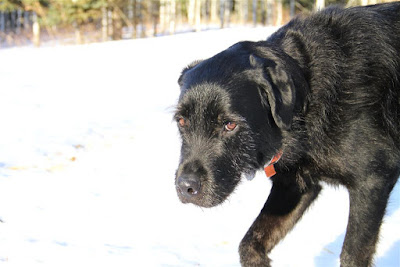Sometime in January after Cleo’s trip to the vet for a mild
bladder infection and after Murdoch’s trip to the vet for his latest tapeworm,
Murdoch swallowed a sock for the second time in his life and I waited anxiously
to see if it would lead to yet another vet visit in the space of three weeks.
I was getting ready to go outside with the dogs, putting on
layer after layer as Molly paced circles around me and Murdoch tap-danced
across the floor. But this day instead of focusing his energies on me Murdoch
sidled up to the woodstove, his head disappearing between it and the wall to
scoop something up in his mouth.
I saw him from the corner of my eye and half-laughed, “Bring
it here Murds,” I said, knowing it was either a mitten that had slipped from
the window seat to the floor as Morgan sat there and laced up his shoes, or a
sock that had been left absentmindedly after being peeled from a wet foot, and
Murdoch was doing that thing he does when he can’t contain his excitement.
Finding stuff to bring me.
It is as though he thinks that bringing me socks or mitts or
toques will somehow make things go faster. Sometimes it is done with an air of
helpfulness. “Can you use this? Can you use this? Will this get us out the door
faster?” But he is like someone with so much nervous energy they just have to
do something, anything, to keep busy and focused.
So I called him over, which usually brings him right away
with whatever he has found stuffed securely in his mouth with small billows of
fabric emerging from either side that I can grasp between my thumb and
forefinger to pluck the object from his mouth all shiny and damp with dog
slobber. But this time he did not come.
I called again, and again, each time with a sharper edge in
my voice as Murdoch’s teeth clonked against the floor and his body moved in
more of a frenzy, the way it does on the trail when he is trying to inhale
something before I can reach him.
“Murdoch!” I half yelled, “Bring it now!” He turned toward
me still moving his jaw determinedly around the black fabric, which I could now
determine was one of Morgan’s socks, and walked the few steps to my side. “What
are you doing?” I said, much more calmly now, back to our old camaraderie of
Murdoch being a goofball and I shaking my head in mock disdain.
His jaw was clamped more tightly than usual around his prize
with just the tiniest corner of the sock sticking out between his teeth. I was
on my knees, looking into one wide, round eye as I reached for it, slightly
confused as to why he had engulfed it so completely. Usually when he picks up a
sock, or a pair, about one-third of the item hangs out and he holds on to it
firmly, but softly. This was different.
My fingers pinched the fabric for just a fraction of a
second before it slipped from my grasp and Murdoch gave one more mighty chomp
with his jaw, sucking the rest of the sock into this mouth, and it was gone. My
fingers were right behind it, breaching the threshold of teeth to the soft,
warm tongue behind, trying to find a scrap of fabric to haul back out. But the
sock was completely gone.
I sat back. Everything was still for a moment, he and I
looked at each other in some sort of surprise before I broke the silence “What
the hell?” I said, reaching for his mouth again and sticking my hand inside in
disbelief, feeling around like someone in a dark room looking for something
that fell to the floor. Cheeks, tongue, roof. Nothing.
“What the hell, Murdoch?” I said again, stepping back in
defeat. “What did you do that for?” And he sat in the middle of the entryway
and stared up at me as though nothing out of the ordinary had happened.
We went for our walk, the dogs leaping ahead happily while I
trudged distractedly behind trying to figure out what happened. Did I really
see that? I wondered. The last time he swallowed a sock, which turned out to be
two socks, they belonged to our young nephew and niece. They were smallish
items and they re-emerged a day later in front of the woodstove, all yellow and
slimy, along with some bits of grass and sticks. I hoped that this would be a
repeat performance, that the size of a grown man’s sock working its way through
his system would not complicate things.
I watched Murdoch closely for the rest of the day, like I
had done the last time, waiting for some sign of stomach upset a lethargic
response to food a low energy afternoon of deeply depressed sighs and
half-closed eyelids, but there was nothing. He acted completely normal, dashing
after sticks, running through the woods, scarfing down his supper, drinking all
the water from his dish in great enthusiastic gulps.
It was another day and a half before we saw the sock again,
in a little pile of goop by the woodstove, and I breathed a sigh of relief I
didn’t realize I had been holding in and I implored Murdoch to never do that
again.
Two days after that I found another sock outside, one that
had gone right through him and I balked as I unfurled it in the snow with the
tines of my rake, “What the…?”, “When the…?” And I wondered, what else is in
there?










